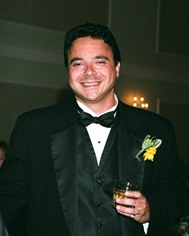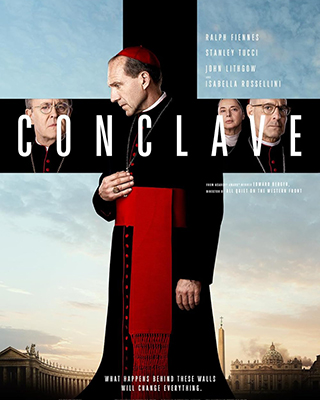While we prepare to vote for our 47th president, Edward Berger’s well-cast and well-acted Vatican drama “Conclave” comes at a good time. As a political expose set like a mystery, “Conclave” isn’t a ‘who-done-it’ but a ‘who-done-it-to-whom.’
Good examinations require a closer look and “Conclave” confines itself to the Pope’s residence where he has just passed. Tasked with the duty of managing the conclave where cardinals from around the world will assemble to vote for the new Pontiff, Cardinal Lawrence (Ralph Fiennes) starts to feel the force of outside factors. First are the differing views of the leading cardinal candidates to become the new Pope, from the liberal-minded Bellini (Stanley Tucci) who would further the Church’s acceptance of gay rights to conservative cardinals like Adeyemi (Lucien Msamati) who would see gays in prison before they spent an afterlife in Hell. Second are the contradictions: Adevemi’s candidacy is opposed by another conservative cardinal named Tedesco (Sergio Castellitto) who believes the appearance of an African Pope wouldn’t conform to hardcore Catholicism. Third are the secrets the Pope kept, from charging Cardinal Tremblay (John Lithgow) with gross misconduct and removing his duties to privately ordaining a cardinal named Benitez (Carlos Diehz) who comes to the conclave as a stranger to the assembled.
The biggest secret we learn, however, is that Lawrence wanted to resign but the Pope refused his request. Already wrestling with his faith yet commanded to oversee the conclave, Lawrence’s pressure is about to peak. Time is of the essence- the more time it takes, the more internal conflict within the church can be construed by the awaiting worldwide congregation of Catholics. With bombs literally exploding outside the papal proceedings, picking a Pope might temper the nearby turmoil.
In addition to trying to uncover the mysteries surrounding Tremblay and Benitez , Lawrence is suspected of wanting to secure the papal position for himself. Though Lawrence denies the accusation, his investigation of Tremblay looks self-serving, “Every Cardinal wants to be Pope,” Bellini tells Lawrence. “What would your name be?” “John,” Lawrence confides to Bellini and with that our confidence in Lawrence comes into question.
“Conclave’s” good at keeping you as complicit as the sequestered cardinals in their developing deceptions and mounting mistrust. The movie shows double dealings and power plays are not unknown entities in imposing institutions, even admitting the deceased Pope “believed in God but not the church.” Lawrence’s discreet digging in divine dirt reminded me a lot of the internal inquiry into scandal that Meryl Streep’s Sister Aloysius dealt with in “Doubt.” Given its close confines, characters keeping everything on the Q.T. is a strength that works in “Conclave’s” favor.
Like all good mysteries when the truth is exposed, we understand the actions. And, with a finale you’ll never figure, “Conclave” also gets its political message across: the real battle in casting your ballot is the fight for everyone’s fundamental rights.

